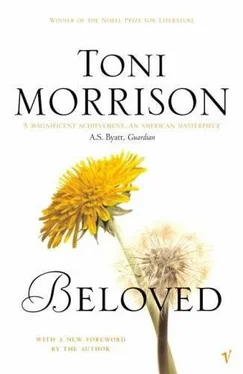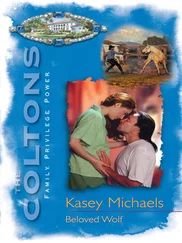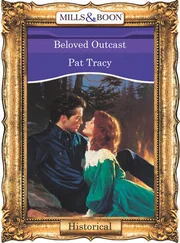Sethe felt herself falling into a sleep she knew would be deep. On the lip of it, just before going under, she thought, "That's pretty.
Denver. Real pretty."
IT WAS TIME to lay it all down. Before Paul D came and sat on her porch steps, words whispered in the keeping room had kept her going. Helped her endure the chastising ghost; refurbished the baby faces of Howard and Buglar and kept them whole in the world because in her dreams she saw only their parts in trees; and kept her husband shadowy but there-somewhere. Now Halle's face between the butter press and the churn swelled larger and larger, crowding her eyes and making her head hurt. She wished for Baby Suggs' fingers molding her nape, reshaping it, saying, "Lay em down, Sethe. Sword and shield. Down. Down. Both of em down. Down by the riverside.
Sword and shield. Don't study war no more. Lay all that mess down.
Sword and shield." And under the pressing fingers and the quiet instructive voice, she would. Her heavy knives of defense against misery, regret, gall and hurt, she placed one by one on a bank where dear water rushed on below.
Nine years without the fingers or the voice of Baby Suggs was too much. And words whispered in the keeping room were too little.
The butter-smeared face of a man God made none sweeter than demanded more: an arch built or a robe sewn. Some fixing ceremony.
Sethe decided to go to the Clearing, back where Baby Suggs had danced in sunlight.
Before 124 and everybody in it had closed down, veiled over and shut away; before it had become the plaything of spirits and the home of the chafed, 124 had been a cheerful, buzzing house where Baby Suggs, holy, loved, cautioned, fed, chastised and soothed. Where not one but two pots simmered on the stove; where the lamp burned all night long. Strangers rested there while children tried on their shoes. Messages were left there, for whoever needed them was sure to stop in one day soon. Talk was low and to the point-for Baby Suggs, holy, didn't approve of extra. "Everything depends on knowing how much," she said, and "Good is knowing when to stop."
It was in front of that 124 that Sethe climbed off a wagon, her newborn tied to her chest, and felt for the first time the wide arms of her mother-in-law, who had made it to Cincinnati. Who decided that, because slave life had "busted her legs, back, head, eyes, hands, kidneys, womb and tongue," she had nothing left to make a living with but her heart-which she put to work at once. Accepting no title of honor before her name, but allowing a small caress after it, she became an unchurched preacher, one who visited pulpits and opened her great heart to those who could use it. In winter and fall she carried it to AME's and Baptists, Holinesses and Sanctifieds, the Church of the Redeemer and the Redeemed. Uncalled, unrobed, un anointed, she let her great heart beat in their presence. When warm weather came, Baby Suggs, holy, followed by every black man, woman and child who could make it through, took her great heart to the Clearing-a wide-open place cut deep in the woods nobody knew for what at the end of a path known only to deer and whoever cleared the land in the first place. In the heat of every Saturday afternoon, she sat in the clearing while the people waited among the trees.
After situating herself on a huge flat-sided rock, Baby Suggs bowed her head and prayed silently. The company watched her from the trees. They knew she was ready when she put her stick down. Then she shouted, "Let the children come!" and they ran from the trees toward her.
"Let your mothers hear you laugh," she told them, and the woods rang. The adults looked on and could not help smiling.
Then "Let the grown men come," she shouted. They stepped out one by one from among the ringing trees.
"Let your wives and your children see you dance," she told them, and groundlife shuddered under their feet.
Finally she called the women to her. "Cry," she told them. "For the living and the dead. Just cry." And without covering their eyes the women let loose.
It started that way: laughing children, dancing men, crying women and then it got mixed up. Women stopped crying and danced; men sat down and cried; children danced, women laughed, children cried until, exhausted and riven, all and each lay about the Clearing damp and gasping for breath. In the silence that followed, Baby Suggs, holy, offered up to them her great big heart.
She did not tell them to clean up their lives or to go and sin no more. She did not tell them they were the blessed of the earth, its inheriting meek or its glorybound pure.
She told them that the only grace they could have was the grace they could imagine. That if they could not see it, they would not have it.
"Here," she said, "in this here place, we flesh; flesh that weeps, laughs; flesh that dances on bare feet in grass. Love it. Love it hard.
Yonder they do not love your flesh. They despise it. They don't love your eyes; they'd just as soon pick em out. No more do they love the skin on your back. Yonder they flay it. And O my people they do not love your hands. Those they only use, tie, bind, chop off and leave empty. Love your hands! Love them. Raise them up and kiss them. Touch others with them, pat them together, stroke them on your face 'cause they don't love that either. You got to love it, you! And no, they ain't in love with your mouth. Yonder, out there, they will see it broken and break it again. What you say out of it they will not heed. What you scream from it they do not hear. What you put into it to nourish your body they will snatch away and give you leavins instead. No, they don't love your mouth. You got to love it.
This is flesh I'm talking about here. Flesh that needs to be loved.
Feet that need to rest and to dance; backs that need support; shoulders that need arms, strong arms I'm telling you. And O my people, out yonder, hear me, they do not love your neck unnoosed and straight. So love your neck; put a hand on it, grace it, stroke it and hold it up. And all your inside parts that they'd just as soon slop for hogs, you got to love them. The dark, dark liver-love it, love it, and the beat and beating heart, love that too. More than eyes or feet.
More than lungs that have yet to draw free air. More than your life holding womb and your life-giving private parts, hear me now, love your heart. For this is the prize." Saying no more, she stood up then and danced with her twisted hip the rest of what her heart had to say while the others opened their mouths and gave her the music.
Long notes held until the four-part harmony was perfect enough for their deeply loved flesh.
Sethe wanted to be there now. At the least to listen to the spaces that the long-ago singing had left behind. At the most to get a clue from her husband's dead mother as to what she should do with her sword and shield now, dear Jesus, now nine years after Baby Suggs, holy, proved herself a liar, dismissed her great heart and lay in the keeping-room bed roused once in a while by a craving for color and not for another thing.
"Those white things have taken all I had or dreamed," she said, "and broke my heartstrings too. There is no bad luck in the world but whitefolks." 124 shut down and put up with the venom of its ghost. No more lamp all night long, or neighbors dropping by. No low conversations after supper. No watched barefoot children playing in the shoes of strangers. Baby Suggs, holy, believed she had lied.
There was no grace-imaginary or real-and no sunlit dance in a Clearing could change that. Her faith, her love, her imagination and her great big old heart began to collapse twenty-eight days after her daughter-in-law arrived.
Yet it was to the Clearing that Sethe determined to go-to pay tribute to Halle. Before the light changed, while it was still the green blessed place she remembered: misty with plant steam and the decay of berries.
Читать дальше











